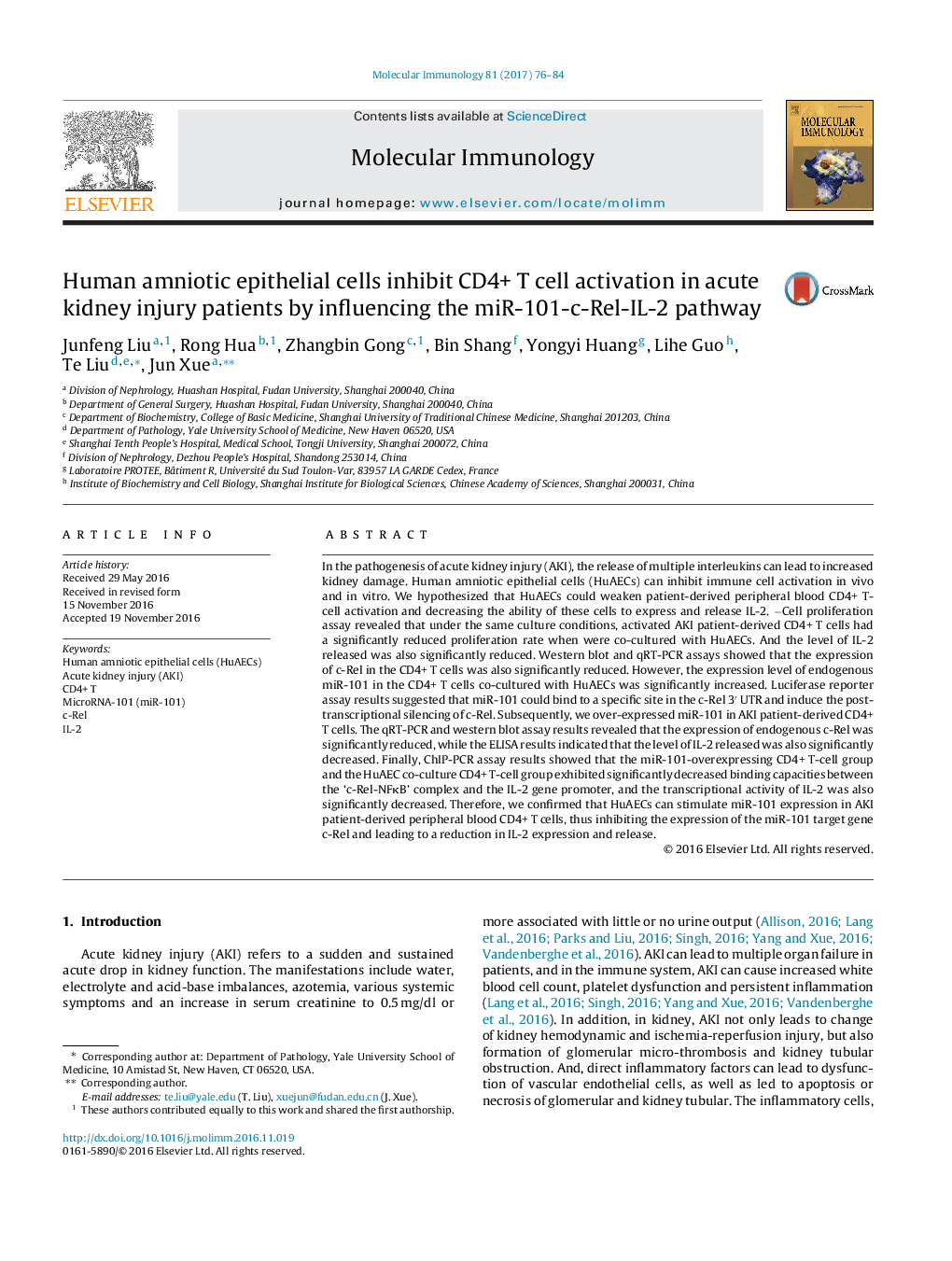| کد مقاله | کد نشریه | سال انتشار | مقاله انگلیسی | نسخه تمام متن |
|---|---|---|---|---|
| 5592076 | 1570712 | 2017 | 9 صفحه PDF | دانلود رایگان |
عنوان انگلیسی مقاله ISI
Human amniotic epithelial cells inhibit CD4+ T cell activation in acute kidney injury patients by influencing the miR-101-c-Rel-IL-2 pathway
دانلود مقاله + سفارش ترجمه
دانلود مقاله ISI انگلیسی
رایگان برای ایرانیان
موضوعات مرتبط
علوم زیستی و بیوفناوری
بیوشیمی، ژنتیک و زیست شناسی مولکولی
زیست شناسی مولکولی
پیش نمایش صفحه اول مقاله

چکیده انگلیسی
In the pathogenesis of acute kidney injury (AKI), the release of multiple interleukins can lead to increased kidney damage. Human amniotic epithelial cells (HuAECs) can inhibit immune cell activation in vivo and in vitro. We hypothesized that HuAECs could weaken patient-derived peripheral blood CD4+ T-cell activation and decreasing the ability of these cells to express and release IL-2. âCell proliferation assay revealed that under the same culture conditions, activated AKI patient-derived CD4+ T cells had a significantly reduced proliferation rate when were co-cultured with HuAECs. And the level of IL-2 released was also significantly reduced. Western blot and qRT-PCR assays showed that the expression of c-Rel in the CD4+ T cells was also significantly reduced. However, the expression level of endogenous miR-101 in the CD4+ T cells co-cultured with HuAECs was significantly increased. Luciferase reporter assay results suggested that miR-101 could bind to a specific site in the c-Rel 3â² UTR and induce the post-transcriptional silencing of c-Rel. Subsequently, we over-expressed miR-101 in AKI patient-derived CD4+ T cells. The qRT-PCR and western blot assay results revealed that the expression of endogenous c-Rel was significantly reduced, while the ELISA results indicated that the level of IL-2 released was also significantly decreased. Finally, ChIP-PCR assay results showed that the miR-101-overexpressing CD4+ T-cell group and the HuAEC co-culture CD4+ T-cell group exhibited significantly decreased binding capacities between the 'c-Rel-NFκB' complex and the IL-2 gene promoter, and the transcriptional activity of IL-2 was also significantly decreased. Therefore, we confirmed that HuAECs can stimulate miR-101 expression in AKI patient-derived peripheral blood CD4+ T cells, thus inhibiting the expression of the miR-101 target gene c-Rel and leading to a reduction in IL-2 expression and release.
ناشر
Database: Elsevier - ScienceDirect (ساینس دایرکت)
Journal: Molecular Immunology - Volume 81, January 2017, Pages 76-84
Journal: Molecular Immunology - Volume 81, January 2017, Pages 76-84
نویسندگان
Junfeng Liu, Rong Hua, Zhangbin Gong, Bin Shang, Yongyi Huang, Lihe Guo, Te Liu, Jun Xue,